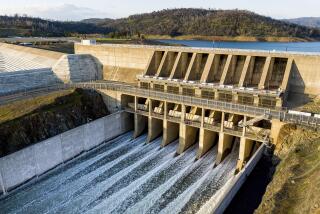U.S. axes Baghdad power data
- Share via
WASHINGTON — As the Bush administration struggles to convince lawmakers that its Iraq war strategy is working, it has stopped reporting to Congress a key quality-of-life indicator in Baghdad: how long the power stays on.
Ryan Crocker, the U.S. ambassador to Iraq, told the Senate Foreign Relations Committee last week that Baghdad residents could count on only “an hour or two a day” of electricity. That’s down from an average of five to six hours a day earlier this year.
But that piece of data has not been sent to lawmakers for months because the State Department, which prepares a weekly “status report” for Congress on conditions in Iraq, stopped estimating in May how many hours of electricity Baghdad residents typically receive each day.
Instead, the department now reports on the electricity generated nationwide, a measurement that does not indicate how much power Iraqis in Baghdad or elsewhere actually receive.
The change, a State Department spokesman said, reflects a technical decision by reconstruction officials in Baghdad who are scaling back efforts to estimate electricity consumption as they wind down U.S. involvement in rebuilding Iraq’s power grid.
Department officials said the new approach was more accurate than the previous estimates, which they said had been very rough and had failed to reflect wide variations across Baghdad and the country.
“Nothing is being hidden. There is no ulterior motive,” said David Foley, the department’s Middle East spokesman. “We are continuing to provide detailed information and have been completely transparent.”
The State Department’s new method shows that the national electricity supply is 4% lower than a year ago, according to the July 11 report.
The reporting change has triggered criticism that the administration is disclosing less information at the same time President Bush is facing off against Congress over how much progress is being made in Iraq. Bush has been working for months to show that the troop buildup he announced in January is stabilizing the country.
“It’s unfortunate,” said Jason H. Campbell, a senior research assistant at the Brookings Institution who has been tracking quality-of-life measurements in Iraq since 2003. “What makes this metric even worth tracking is you want to see what’s happening to the average Iraqi.”
Campbell said the new reporting method made it impossible to know what the power situation was in Baghdad and elsewhere in Iraq.
Col. Mike Moon, who oversees the Army Corps of Engineers’ electricity reconstruction efforts in Iraq, said he thought the change was a mistake. The total amount of electricity being generated in Iraq makes no difference to the individual who has no electricity for his air conditioner, Moon said.
Sen. Barbara Boxer (D-Calif.), who sharply questioned Crocker about electricity during a recent Senate Foreign Relations Committee hearing, sent a letter to the State Department last week complaining about the new measurement. She said she was concerned the White House was trying to obscure the deteriorating situation in Baghdad, the focus of Bush’s “surge” of 30,000 additional troops.
“The president continues to keep information away from the American people and the Congress,” said Boxer, who advocates withdrawing troops. “It’s obvious that he wants to paint a rosy picture.”
State Department officials in Baghdad and Washington said the new method was not an attempt to hide information. They noted that Crocker was candid about the electricity situation when he testified to lawmakers last week.
Iraq’s electricity supply has received less attention than other national indicators as debate over the president’s surge has intensified in Washington.
The administration’s July progress report focused on 18 benchmarks of Iraqi government progress toward political reconciliation among ethnic and religious communities.
However, the reliability of the electricity supply has long been seen by Iraqis as a key indicator of the success of the U.S. enterprise.
Crocker told CBS News this month that electricity was “more important to the average Iraqi than all 18 benchmarks rolled up into one.”
In the spring, the State Department reported that Baghdad residents were typically receiving up to six hours of electricity a day. In the rest of the country, Iraqis could count on 10 or 11 hours.
But the situation has deteriorated substantially as stifling heat has set in. Temperatures in Baghdad are now reaching above 110.
U.S. officials say that they have made progress and that the persistent electricity shortages partly reflect growing demand as Iraqis buy more air conditioners, refrigerators and other appliances.
Continuing instability is also a factor, U.S. officials acknowledge.
“The main reasons have to do with continued attacks by insurgents against electrical transmission lines and against fuel pipelines that provide the energy source that you need to generate electricity,” Crocker told the Senate Foreign Relations Committee.
Those problems have been compounded by the slow pace of rebuilding a power system that had been deteriorating for years before the U.S. invasion, said Moon of the Army Corps of Engineers.
For many on Capitol Hill, the pace of progress is increasingly frustrating. “Here we are in the fifth year, and we simply have not greatly improved the quality of life,” said Sen. John W. Warner (R-Va.), who has called on the president to draw up a plan for a withdrawal. “It’s very troubling.”
--
alexandra.zavis@latimes.com
Levey reported from Washington and Zavis from Baghdad. A Times special correspondent in Baghdad contributed to this report.
More to Read
Sign up for Essential California
The most important California stories and recommendations in your inbox every morning.
You may occasionally receive promotional content from the Los Angeles Times.











